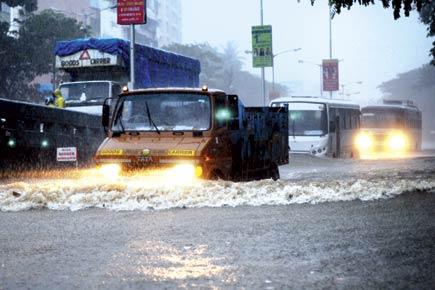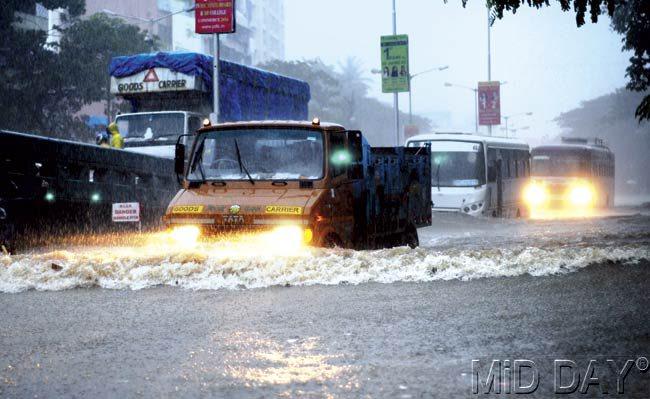The team, including railways, civic bodies, BEST undertaking, Navy and Disaster Control are planning to coordinate in case any single mode of transport breaks down due to heavy rainfall

With rain continuing to lash the island city on Thursday, an emergency team constituting various transport agencies have discussed plans, as weather department has warned another 24 hours of continuous rainfall.
ADVERTISEMENT

Water logging was observed on various roads and traffic snarls increased during morning and evening peak hours. Pic/Satyajit Desai
The team has also installed a hotline to coordinate among themselves in case of any emergency. The emergency team includes the railways, Brihanmumbai Municipal Corporation (BMC) along with BEST undertaking, Navy and Disaster Control. Sources said that the heavy rainfall along with high tide of 4.13 metres yesterday prompted the transport authority to prepare for any emergency.
“In case there is water logging on tracks and trains are unable to ply, then other transport authorities like BEST will have to operate more buses. Boats can be arranged with the help of Navy and disaster management agencies will lend their hand in case of extreme conditions,” informed a senior railway official.
Trains delayed
On Thursday, the Western Railway (WR) cancelled close to 18 trains, while the Central Railway (CR) cancelled more than 20 local trains, mainly due to heavy rainfall. Commuters observed that many times trains were cancelled even without announcements at stations. CR locals moved at a snail’s pace and were running late by at least 45 minutes, while WR trains ran late by 15 minutes.
By evening, heavy flooding was observed on tracks, especially on the Central line, including Harbour corridor. Water logging was seen at Masjid Bunder, Sandhurst Road, Byculla, Raoli junction, Wadala, Vidyavihar, Bhandup, Vikhroli, Badlapur and Ambernath.
On the Western line, water logging was mainly observed beyond Virar towards Dahanu at various areas of the 60-km route. As a result, long distance trains on both the railways were running as late as five hours. An official added that due to delays of long distance trains, a few locals were cleared early and reached before time as well.
On road
Traffic jams were observed at various roads in the city. Vehicles were stuck for hours on SV Road, Western Express Highway, Eastern Express Highway, Peddar Road, and LBS Marg especially during morning and evening peak hours.
Traffic police were seen struggling to control vehicular movement, with constant honking and breaking of traffic light. Cops have also kept cranes at the end of flyovers and elevated link roads to pick up vehicles that broke down in the middle of the road.
Buses also faced problems and were found stuck in traffic, especially near railway stations. Buses were diverted from AC Market, Grant Road, King’s Circle, Sion, Hindmata and Lalbaug due to water logging. According to sources, the number of buses, which on a normal day is usually around 3,900, had also decreased due to heavy vehicular traffic.
Shailendra Kumar, Divisional Railway Manager (Mumbai), WR, said “There were issues from Virar right up to Ahmedabad due to heavy rains and technical issues. The suburban section is otherwise running smoothly and there was no water logging reported.”
Mukhesh Nigam, Divisional Railway Manager (Mumbai), CR, said “Digital axle counters, which ensure that signals function even if there is water logging, haven’t been installed at a few locations like Raoli junction, Wadala, Vidyavihar, Bhandup that led to signal failure. Due to this, there were technical issues, apart from water logging.
Dr Pratap Dighavkar, Deputy Commissioner of Police (Traffic), said, “We have tied up with local police stations for more manpower for better coordination of traffic. Cranes too have been placed near every flyover for picking up stranded vehicles.”
AS Tamboli, chief spokesperson, BEST Undertaking, said, “Due to traffic snarls, buses were stuck on the road and didn’t reach depots on time. There were also diversions of our buses at few places due to water logging.”
 Subscribe today by clicking the link and stay updated with the latest news!" Click here!
Subscribe today by clicking the link and stay updated with the latest news!" Click here!






